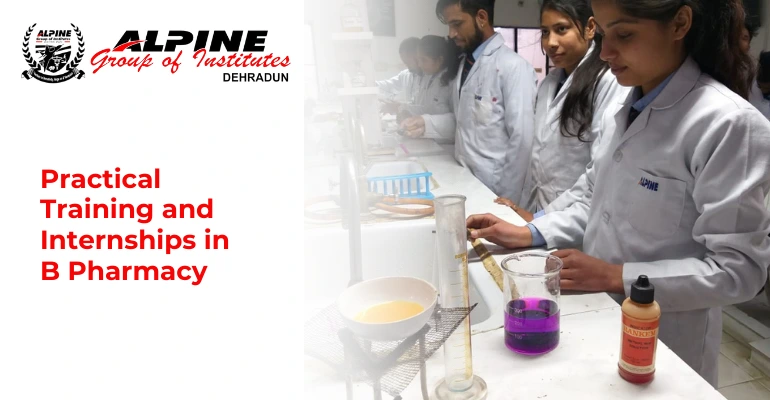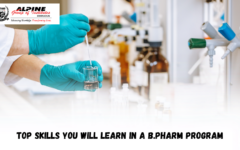Practical Training and Internships in B Pharmacy
2024-12-18 8:21Practical Training and Internships in B Pharmacy
Practical training and internships are essential components of the B Pharmacy curriculum. They provide students with hands-on experience, bridging the gap between theoretical knowledge and real-world pharmaceutical practice. These experiences are critical for building the skills and competencies necessary for a successful career in the pharmaceutical industry, healthcare, or research sectors.
Importance of Practical Training in B Pharmacy
- Application of Theoretical Knowledge:
The theoretical knowledge gained during classroom learning needs to be applied in real-world scenarios. Practical training ensures that students can implement their knowledge of pharmacology, chemistry, and pharmaceutics in actual pharmaceutical settings. - Skill Development:
Practical training helps students develop essential skills such as:
- Drug formulation and dosage preparation
- Patient counseling
- Identifying and solving pharmaceutical problems
- Interacting with healthcare professionals and patients
- Working with sophisticated laboratory equipment
- Industry Exposure:
Internships provide exposure to the pharmaceutical industry, where students learn about drug manufacturing, quality control, research and development (R&D), and regulatory affairs. This exposure helps students understand the operational aspects of the industry. - Career Readiness:
Internships allow students to work in real-world environments, helping them become job-ready by understanding workplace dynamics, healthcare regulations, and ethical standards. It also provides students with networking opportunities, which can be valuable when seeking future employment.
Types of Practical Training and Internships in B Pharmacy
- Pharmaceutical Manufacturing Training:
- In this phase, students gain hands-on experience in pharmaceutical manufacturing units. They learn about the formulation of drugs, quality control, packaging, and distribution of medicines. Students may be involved in understanding the processes of making tablets, capsules, injections, ointments, and more.
- They may be introduced to Good Manufacturing Practices (GMP), which are essential for ensuring product quality and safety.
- Hospital Pharmacy Internship:
- Hospital pharmacy internships offer an in-depth view of how pharmacists play a role in patient care. Students work in hospital pharmacies, where they assist licensed pharmacists in dispensing medicines, preparing intravenous medications, and monitoring patient medication therapies.
- They learn about clinical pharmacy, which includes drug therapy management, preventing drug interactions, and educating patients about proper medication use.
- Retail Pharmacy Internship:
- In retail pharmacy internships, students work in community pharmacies, where they observe the dispensing of prescriptions, assist with patient counseling, and help in managing inventory. Retail pharmacy internships also provide exposure to over-the-counter (OTC) drugs, prescription medications, and the business side of a pharmacy.
- Students gain practical experience in advising patients on how to take medications safely and how to manage and sell pharmaceutical products.
- Pharmaceutical Research and Development (R&D):
- For students interested in pharmaceutical research, an internship in R&D provides an opportunity to work in labs where new drugs are discovered, formulated, and tested. They assist researchers in conducting experiments, preparing samples for clinical trials, and analyzing research data.
- They may also be involved in preclinical and clinical trial processes, helping test the safety and efficacy of new drugs.
- Quality Control and Assurance Internship:
- Internships in quality control (QC) or quality assurance (QA) departments expose students to the importance of ensuring that drugs meet safety standards. Students may learn about analytical testing, stability studies, regulatory guidelines, and inspection procedures.
- Understanding the roles of QC and QA ensures that students grasp the importance of drug safety, efficacy, and regulatory compliance, which are critical for patient well-being.
- Regulatory Affairs Internship:
- A regulatory affairs internship involves working with pharmaceutical companies or regulatory agencies that deal with drug approvals, clinical trials, and post-market surveillance. Students learn about the legal and ethical considerations involved in getting drugs approved by regulatory bodies such as the FDA or EMA.
- This internship provides insight into the documentation, licensing requirements, and global regulations surrounding the sale and distribution of pharmaceutical products.
- Pharmacovigilance and Drug Safety:
- Pharmacovigilance internships help students understand how to monitor and report the safety of medicines once they are available on the market. Students are introduced to the process of tracking adverse drug reactions (ADR) and reporting them to regulatory bodies.
- They learn about drug safety monitoring techniques, data collection, and the importance of ensuring that marketed drugs remain safe for consumers.
Duration and Structure of Internships
- Duration: Internships typically range from 4 weeks to 6 months, depending on the institution, the type of internship, and the country.
- Structured Internship Programs: Some universities have structured internships, where students are required to complete internships at designated pharmaceutical companies, hospitals, or research institutes. Others may allow students to choose their internships in collaboration with faculty.
- Hands-on Learning: During these internships, students are typically supervised by professionals who guide them and ensure they gain valuable experience. This mentorship helps students navigate complex situations and understand real-world pharmaceutical practices.
Benefits of Practical Training and Internships
- Exposure to Cutting-Edge Technology:
Internships expose students to advanced pharmaceutical technologies, laboratory equipment, and production processes that they might not be able to learn in a classroom setting. - Professional Networking:
Interning at established pharmaceutical companies, hospitals, or research institutions allows students to connect with professionals in the field. Networking during internships often leads to job offers or collaborations in the future. - Improved Career Prospects:
Practical training and internships can enhance employability. Employers prefer candidates with real-world experience, as it shows initiative and the ability to adapt to the industry’s challenges. It also allows students to apply for positions in highly competitive pharmaceutical companies. - Development of Soft Skills:
Alongside technical knowledge, students also develop important soft skills such as communication, teamwork, time management, and problem-solving, which are crucial for working in fast-paced, dynamic environments. - Increased Confidence:
Working in a real-world setting builds confidence and prepares students to handle challenging situations, whether in a research laboratory or a patient care setting.
Key Takeaways from Practical Training and Internships
- Real-World Experience: Internships offer a chance to see the practical aspects of pharmacy work, from drug formulation to patient care.
- Career Exploration: Students can explore various sectors of the pharmaceutical industry, such as retail pharmacy, clinical pharmacy, research, manufacturing, and regulatory affairs.
- Skill Enhancement: Students gain valuable hands-on skills that cannot be fully learned through textbooks alone, making them better prepared for a career in the pharmaceutical field.
- Industry Connections: Internships are a valuable networking opportunity, helping students build relationships that can lead to future job offers or research collaborations.
Conclusion
Practical training and internships are integral to the B Pharmacy program. These experiences provide students with the opportunity to apply their theoretical knowledge in real-world settings, gain hands-on skills, and explore the diverse career paths available in the pharmaceutical and healthcare industries. Whether working in pharmaceutical manufacturing, hospital pharmacy, research, or regulatory affairs, the practical training that students receive during their B Pharmacy program plays a pivotal role in shaping their professional journey and preparing them for success in their chosen careers.








